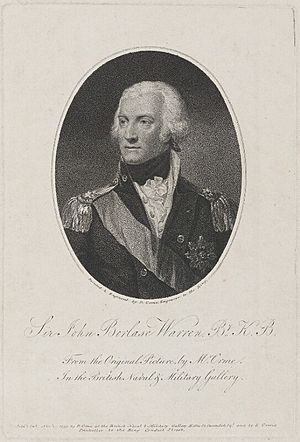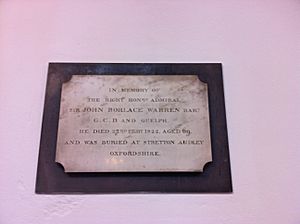John Borlase Warren facts for kids
Quick facts for kids
John Borlase Warren
|
|
|---|---|

Sir John Borlase Warren, by Daniel Orme, 1799
|
|
| Born | 2 September 1753 Stapleford, Nottinghamshire, England |
| Died | 27 February 1822 (aged 68) Greenwich Hospital, London |
| Allegiance | |
| Service/ |
|
| Years of service | 1771–1799 |
| Rank | Admiral |
| Battles/wars | Battle of Tory Island Invasion of France (1795) (incomplete list) |
| Awards | Baronet |
Admiral Sir John Borlase Warren, 1st Baronet (2 September 1753 – 27 February 1822) was a brave British Royal Navy officer. He was also a diplomat and a politician. He served in the House of Commons, which is part of the British Parliament, from 1774 to 1807.
John Borlase Warren was born on 2 September 1753 in Stapleford, Nottinghamshire, England. His father was also named John Borlase Warren.
He went to Cambridge University in 1769. But his true calling was the sea! In 1771, he joined the navy as an ordinary sailor.
Just three years later, in 1774, he became a member of Parliament. This meant he helped make laws for the country. In 1775, he was given the special title of baronet. This title had been held by his family before.
In 1780, he married Caroline Clavering. She passed away many years later in 1839.
A Career at Sea
Sir John's naval career really took off in 1777. Within two years, he was given command of his own ship. He quickly became known for his skill and bravery.
In 1794, he was a Commodore. This meant he led a group of warships called a squadron. His squadron was off the coast of France, helping to block French ports. On 23 April 1794, his ships successfully captured several French warships.
The next year, in 1795, he led one of the squadrons that carried soldiers for an important mission called the Quiberon expedition. In 1796, his squadron was very active near France. They reportedly captured or destroyed 220 enemy vessels!
One of his most famous actions happened in October 1798. A large French fleet, carrying 5,000 soldiers, tried to invade Ireland. Sir John's squadron played a key role in stopping this invasion. His actions off the coast of Donegal helped protect Ireland.

Later Years and Achievements
In 1802, Sir John was made a member of the Privy Council. This is a group of important advisors to the King. He was also sent to St. Petersburg (in Russia) as an ambassador. This meant he represented Britain in another country.
Even with his diplomatic duties, he continued his naval service. In 1806, he captured a large French warship called the Marengo.
From 1807 to 1810, he was the commander-in-chief of the British naval forces in North America and the West Indies. He became a full admiral in 1810. He returned to command the North American Station again from 1813 to 1814.
During the War of 1812, in 1814, British troops invaded Maryland in the United States. Sir John led a group of British soldiers who took over Havre de Grace. They set fire to parts of the town.
Sir John Borlase Warren passed away on 27 February 1822. He is remembered with a special monument in St Mary's Church, Attenborough in Nottinghamshire. He was a popular figure in his home area. You can even find pubs named after him in Nottingham and nearby towns!

